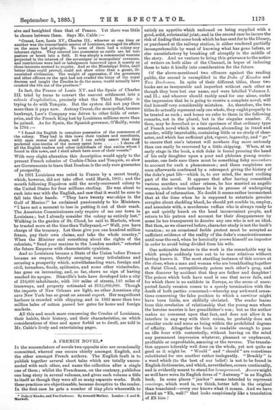A FRENCH NOVEL.*
IN the nomenclature of novels two opposite sins are occasionally committed, whereof one occurs chiefly amongst English, and the other amongst French authors. The English fault is to publish together several short tales which are totally uncon- nected with each other, and name the collection after a single one of them ; whilst the Frenchman, on the contrary, publishes one long story in several volumes, and gives each volume a title to itself as though they were all so many separate works. Both these practices are objectionable, because deceptive to the reader. In the first case he gets a number of tiny plats wherewith to • Duke of 'Candor, and Two Duchesses. By Arnonld Mathey. London : d. and R. Maxwell.
satisfy an appetite which reckoned on being supplied with a good, solid, substantial joint; and in the second case he incurs the risk of finding that some book which he has sent for to the library, or purchased at the railway station, is either rendered partially incomprehensible by want of knowing what has gone before, or else unsatisfactory by breaking off abruptly in the middle of the story. And we venture to bring this grievance to the notice of writers on both sides of the Channel, in hopes of inducing them to take it kindly into consideration for the future.
Of the above-mentioned two offences against the reading public, the second is exemplified in the Duke of Sand,os and Two Duchesses. In spite of their different titles, these two books are as inseparable and imperfect without each other as though they bore but one name, and were labelled Volumes I. and II.; and whoever should rashly send for one alone, under the impression that he is going to receive a complete novel, will find himself very considerably mistaken. As, therefore, the two titles do actually represent only one whole, they ought properly to be treated as such ; and hence we refer to them in the following remarks, not in the plural, but in the singular number. It, then, may be described as a fair specimen of that ordinary type of French novel which is sensational, abounding in fraud and murder, wildly improbable, containing little or no study of char- acter, and which has sufficient plot, vigour, ingenuity, and " go " to ensure that one's interest will nowhere flag more seriously than can easily be recovered by a little skipping. When, at an early stage in the book, a rich duke is found pressing the hand of his only daughter upon a poor and plebeian young music- master, one feels sure there must be something fishy somewhere to account for such a phenomenon ; and these suspicions are soon afterwards confirmed by a retrospect giving the history of the duke's past life—which is, to our mind, the most exciting part of the novel. It appears that after having committed various murders and other crimes, he has married an angelic woman, under whose influence he is in process of undergoing some kind of reformation. No doubt it seems rather inconsistent that at the time when he is supposed to entertain genuine scruples about shedding blood, he should yet confide in, employ, and associate with, a murderous ruffian who is always ready to go and quietly knock on the head inconvenient people, and return to his patron and account for their disappearance by some lie too transparent to deceive any one who is not an idiot. But then, as we observed before, character-study is not the book's vocation ; so an occasional feeble protest must be accepted as sufficient evidence of the reality of the duke's conscientiousness until near the end, when he heroically avows himself an impostor in order to avoid being divided from his wife.
One noticeable feature in the work is the remarkable way in which people suddenly turn out to be near relatives without having known it. The most startling instance of this occurs at the close, when a man and woman who are breakfasting together at Saint Cloud, surreptitiously poison each other's grog, and then discover by accident that they are father and daughter ! The poison which both have used is one that never fails, and for which there is no antidote in Europe, so the scene of unex- pected family reunion comes to a speedy termination with the death of both parties concerned—whereby any awkward sensa- tions concerning the false position to which a survivor might have been liable, are skilfully obviated. The reader learns from this revelation of relationship that the young man whom the heroine marries is her grandfather's eon ; but as the author makes no comment upon that fact, and does not allow it to interfere in any way with their union, he probably does not consider uncle and niece as being within the prohibited degrees of affinity. Altogether the book is readable enough to pass an idle hour with contentedly, without leaving on the mind any permanent impression whatever, pleasant or unpleasant, profitable or unprofitable, amusing or the reverse. The transla- tion appears tolerably well done on the whole, yet not quite as good as it might be. " Would " and " should " are sometimes substituted for one another rather inelegantly. " Bruskly " is a word which (to the best of our belief) is not to be found in English dictionaries, and which, nevertheless, occurs continually, and is evidently meant to stand for brusquement. Anvers might as well have worn its English dress of " Antwerp " in an English book. In some places " janitor " seems intended to represent concierge, which word is, we think, better left in the original than translated—every one knows what it means. And we have found an "Eh, well !" that looks suspiciously like a translation: of Eh Bien !


































 Previous page
Previous page